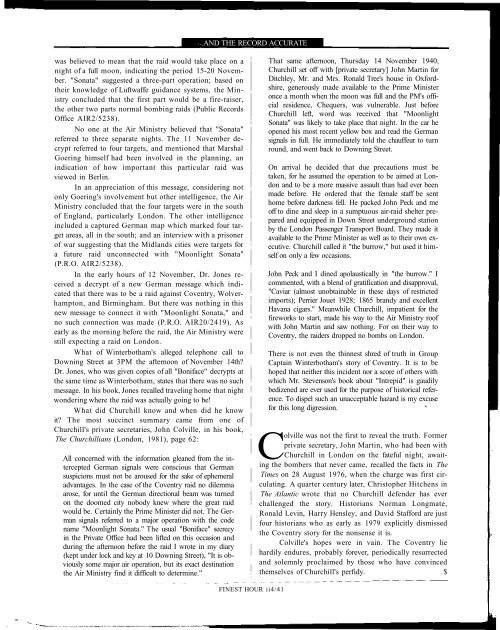Q - Winston Churchill
Q - Winston Churchill
Q - Winston Churchill
- No tags were found...
You also want an ePaper? Increase the reach of your titles
YUMPU automatically turns print PDFs into web optimized ePapers that Google loves.
.AND THE RECORD ACCURATEwas believed to mean that the raid would take place on anight of a full moon, indicating the period 15-20 November."Sonata" suggested a three-part operation; based ontheir knowledge of Luftwaffe guidance systems, the Ministryconcluded that the first part would be a fire-raiser,the other two parts normal bombing raids (Public RecordsOffice AIR2/5238).No one at the Air Ministry believed that "Sonata"referred to three separate nights. The 11 November decryptreferred to four targets, and mentioned that MarshalGoering himself had been involved in the planning, anindication of how important this particular raid wasviewed in Berlin.In an appreciation of this message, considering notonly Goering's involvement but other intelligence, the AirMinistry concluded that the four targets were in the southof England, particularly London. The other intelligenceincluded a captured German map which marked four targetareas, all in the south; and an interview with a prisonerof war suggesting that the Midlands cities were targets fora future raid unconnected with "Moonlight Sonata"(P.R.O. AIR2/5238).In the early hours of 12 November, Dr. Jones receiveda decrypt of a new German message which indicatedthat there was to be a raid against Coventry, Wolverhampton,and Birmingham. But there was nothing in thisnew message to connect it with "Moonlight Sonata," andno such connection was made (P.R.O. AIR20/2419). Asearly as the morning before the raid, the Air Ministry werestill expecting a raid on London.What of Winterbotham's alleged telephone call toDowning Street at 3PM the afternoon of November 14th?Dr. Jones, who was given copies of all "Boniface" decrypts atthe same time as Winterbotham, states that there was no suchmessage. In his book, Jones recalled traveling home that nightwondering where the raid was actually going to be!What did <strong>Churchill</strong> know and when did he knowit? The most succinct summary came from one of<strong>Churchill</strong>'s private secretaries, John Colville, in his book,The <strong>Churchill</strong>ians (London, 1981), page 62:All concerned with the information gleaned from the interceptedGerman signals were conscious that Germansuspicions must not be aroused for the sake of ephemeraladvantages. In the case of the Coventry raid no dilemmaarose, for until the German directional beam was turnedon the doomed city nobody knew where the great raidwould be. Certainly the Prime Minister did not. The Germansignals referred to a major operation with the codename "Moonlight Sonata." The usual "Boniface" secrecyin the Private Office had been lifted on this occasion andduring the afternoon before the raid I wrote in my diary(kept under lock and key at 10 Downing Street), "It is obviouslysome major air operation, but its exact destinationthe Air Ministry find it difficult to determine."That same afternoon, Thursday 14 November 1940,<strong>Churchill</strong> set off with [private secretary] John Martin forDitchley, Mr. and Mrs. Ronald Tree's house in Oxfordshire,generously made available to the Prime Ministeronce a month when the moon was full and the PM's officialresidence, Chequers, was vulnerable. Just before<strong>Churchill</strong> left, word was received that "MoonlightSonata" was likely to take place that night. In the car heopened his most recent yellow box and read the Germansignals in full. He immediately told the chauffeur to turnround, and went back to Downing Street.On arrival he decided that due precautions must betaken, for he assumed the operation to be aimed at Londonand to be a more massive assault than had ever beenmade before. He ordered that the female staff be senthome before darkness fell. He packed John Peck and meoff to dine and sleep in a sumptuous air-raid shelter preparedand equipped in Down Street underground stationby the London Passenger Transport Board. They made itavailable to the Prime Minister as well as to their own executive.<strong>Churchill</strong> called it "the burrow," but used it himselfon only a few occasions.John Peck and I dined apolaustically in "the burrow." Icommented, with a blend of gratification and disapproval,"Caviar (almost unobtainable in these days of restrictedimports); Perrier Jouet 1928; 1865 brandy and excellentHavana cigars." Meanwhile <strong>Churchill</strong>, impatient for thefireworks to start, made his way to the Air Ministry roofwith John Martin and saw nothing. For on their way toCoventry, the raiders dropped no bombs on London.There is not even the thinnest shred of truth in GroupCaptain Winterbotham's story of Coventry. It is to behoped that neither this incident nor a score of others withwhich Mr. Stevenson's book about "Intrepid" is gaudilybedizened are ever used for the purpose of historical reference.To dispel such an unacceptable hazard is my excusefor this long digression.Colville was not the first to reveal the truth. Formerprivate secretary, John Martin, who had been with<strong>Churchill</strong> in London on the fateful night, awaitingthe bombers that never came, recalled the facts in TheTimes on 28 August 1976, when the charge was first circulating.A quarter century later, Christopher Hitchens inThe Atlantic wrote that no <strong>Churchill</strong> defender has everchallenged the story. Historians Norman Longmate,Ronald Levin, Harry Hensley, and David Stafford are justfour historians who as early as 1979 explicitly dismissedthe Coventry story for the nonsense it is.Colville's hopes were in vain. The Coventry liehardily endures, probably forever, periodically resurrectedand solemnly proclaimed by those who have convincedthemselves of <strong>Churchill</strong>'s perfidy. $FINEST HOUR ii4/41

















